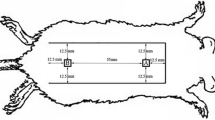Abstract
The hypothesis as to whether gene therapy may induce functional angiogenesis in the rat superficial epigastric island flap would allow earlier pedicle division, was tested and the results are presented. Autologous rat fibroblasts were grown, harvested, cultured and retrovirally transfected to produce platelet-derived growth factor (PDGF)-AA, an angiogenetically active protein. Stable gene expression was monitored by PDGF-AA enzyme-linked immunosorbent assay (ELISA). One hundred eighty animals were divided into three groups (I-III) and a bilateral flap created in each animal. In all experiments, the right-sided flap was subjected to the experimental treatment and the left-sided flap served as control (1 ml saline 0.9%). During flap elevation, group 1 received 5×106 genetically modified fibroblasts (GMFB ) plus 1 ml DMEM as medium. Group 2 was treated with 5×106 non-modified fibroblasts (NMFB ) plus 1 ml medium; and group 3 received 1 ml medium alone. The flaps were sutured back and the vascular pedicle was bilaterally ligated and divided in each batch of 10 animals during the following 6 days. Seven days later, the flaps were harvested, the amount of necrosis measured and histologically examined. The GMFB produced up to 560 times more PDGF-AA than the NMFB, measured by ELISA. Clinically, the GMFB-treated flaps tolerated surgical division of the vascular pedicle significantly earlier than groups 2 and 3. Histologically, fibroblasts persisted in all flaps of groups 1 and 2 without major inflammatory reaction. In all GMFB-treated massive angiogenesis could be demonstrated. By means of retroviral gene transfer autologous rat fibroblasts can be genetically modified for stable expression of the PDGF-A gene to produce high amounts of PDGF-AA, which is angiogenetically active. After injection into the panniculus carnosus, these cells induce functional angiogenesis to permit earlier division of the vascular pedicle in this flap model.
Similar content being viewed by others
Author information
Authors and Affiliations
Rights and permissions
About this article
Cite this article
Machens, HG., Morgan, J., Berthiaume, F. et al. Genetically modified fibroblasts induce angiogenesis in the 3×6 cm rat epigastric island flap. E J Plastic Surg 22, 203–209 (1999). https://doi.org/10.1007/s002380050188
Issue Date:
DOI: https://doi.org/10.1007/s002380050188




